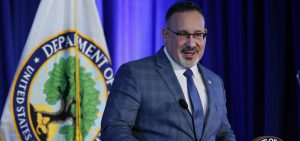News
Feds offer new protections against programs that lead to high student debt, low pay
By: Elissa Nadworny | NPR
Posted on:
WASHINGTON (NPR) — The Biden administration is cracking down on college programs that don’t adequately prepare graduates for gainful employment. On Wednesday, the U.S. Education Department announced new federal regulations that aim to hold for-profit colleges accountable for student outcomes.

The gainful employment rule is meant to safeguard students from making a bad investment at for-profit institutions and non-degree, certificate programs. If programs don’t earn their graduates adequate pay, or if graduates’ earnings are too low to afford their student loan payments, programs could lose access to federal money.
“Too often, students and parents navigate decisions without a clear picture of which schools offer the best value for your money,” Cardona said. “This rule would make sure students know they’re about to take out loans for programs known to leave graduates with unaffordable debt and poor career prospects.”
Starting next school year – July 1, 2024 – programs will have to demonstrate that graduates are able to afford their student debt payments and make more money than an adult in their state who didn’t go to college. If a program fails either of those metrics, students will get a warning before they take out federal student loans. If a program fails the same metric twice in a three-year period, it will lose eligibility to collect federal student aid money from students. The first year this could happen to a program is 2026.
“Today’s action … is the strongest action ever taken by an administration to hold low-quality programs accountable,” says Carolyn Fast, the director of higher education at The Century Foundation. Fast was also involved in the rulemaking. “It steers students toward high-value programs and holds institutions accountable for what it is they should be doing: offering students quality education and preparing them for stable future careers.”
Data from the Education Department anticipates that about 1,700 programs will fail to meet the thresholds set forth in the rule. While many public and private nonprofit colleges offer non-degree programs, very few would fail, according to the department. Rather, many of the failed programs would be at for-profit schools.
The rule applies to all for-profit programs but doesn’t include bachelor’s degrees and most graduate programs at traditional public and nonprofit colleges. Critics of the rule say that’s unfair.
“Once again, the Department has rushed the process, overlooking critical issues, to hastily implement and weaponize a final Gainful Employment rule against for-profit institutions,” said Jason Altmire, president of Career Education Colleges and Universities, a national organization that represents for-profit colleges.
Gainful employment first came to be a federal rule under the Obama administration in 2014. It was met with legal challenges, and when the Trump administration took over, former Secretary of Education Betsy Devos seriously delayed the rule and later scrapped it all together.
This spring, the Biden administration resuscitated the rule with an updated proposal that saw thousands of comments, many from organizations related to the cosmetology industry, which include schools that have historically struggled with favorable debt-to-earnings ratios.
The new rule’s timeline may put it at odds with political headwinds: A lot could happen between now and 2026, when the first programs could lose eligibility to collect federal student aid – including a Republican winning back the White House.
The final rule will be published in the Federal Register on October 10.
9(MDU1ODUxOTA3MDE2MDQwNjY2NjEyM2Q3ZA000))

